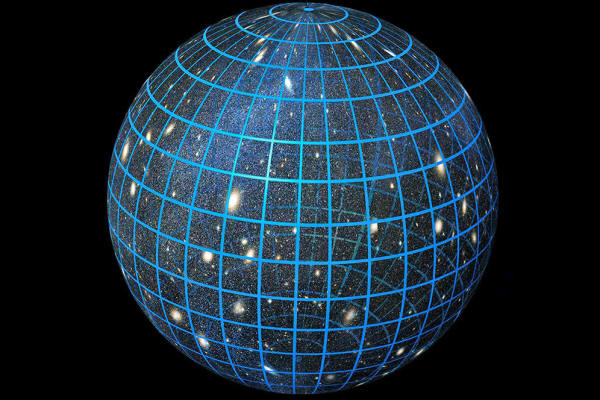|
by Leah Crane November 04, 2019
from
NewScientist Website
Measurements from the
Planck space observatory have shown that the universe might be
shaped like a sphere rather than a flat sheet, which would change
nearly everything we think we know about the cosmos.
Alessandro Melchiorri
at the
Sapienza University of Rome and
his colleagues calculated that this could be because the shape of
the universe is different from what we thought.
These Planck measurements indicate that it could be "closed", or spherical, which would mean that if you travelled far enough in one direction, you would end up back where you started.
That is because the extra
lensing implies the presence of extra
dark matter, which would pull the
universe into a finite sphere instead of a flat sheet.
If the universe is indeed closed, that could be a major problem for our understanding of the cosmos.
Another cosmological puzzle is that the nearby universe seems to be expanding faster than it ought to. This is tough to explain with our standard model of cosmology, which includes a flat universe, and the team calculated that this gets even tougher with a spherical universe, along with a few other cosmic mismatches we have yet to explain.
It is so bad that they are calling it a "cosmological crisis".
The usual explanation of the universe's formation includes a period just after the big bang called inflation, when the universe rapidly expanded.
Our current models of inflation naturally lead to a flat universe, so if the universe is actually closed, they would have to change.
Nobody has come up with a
way to reconcile these Planck observations with the many
cosmological measurements that disagree, which even include some of
the other observations from the Planck observatory.
There are no other observations that hint the cosmos may actually be closed, and there is a chance that this Planck measurement is just a statistical fluke.
More data in the next few years will show whether we need to take this anomaly seriously or if it is simply a statistical fluke, says David Spergel.
The
Simons Observatory, which is
currently being built in Chile, will be able to measure
gravitational lensing even more precisely than Planck, and it should
tell us whether or not there really is a cosmological crisis.
Reference
|


